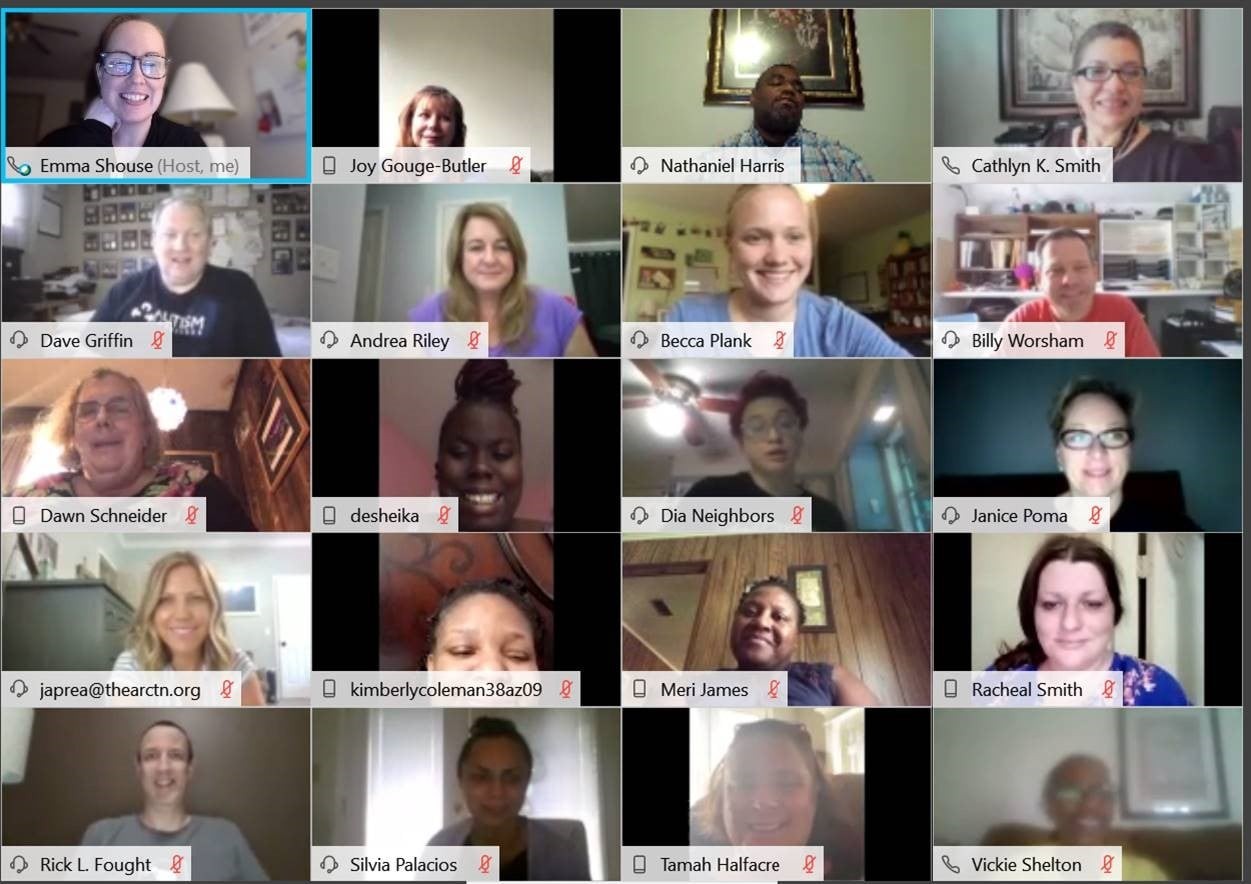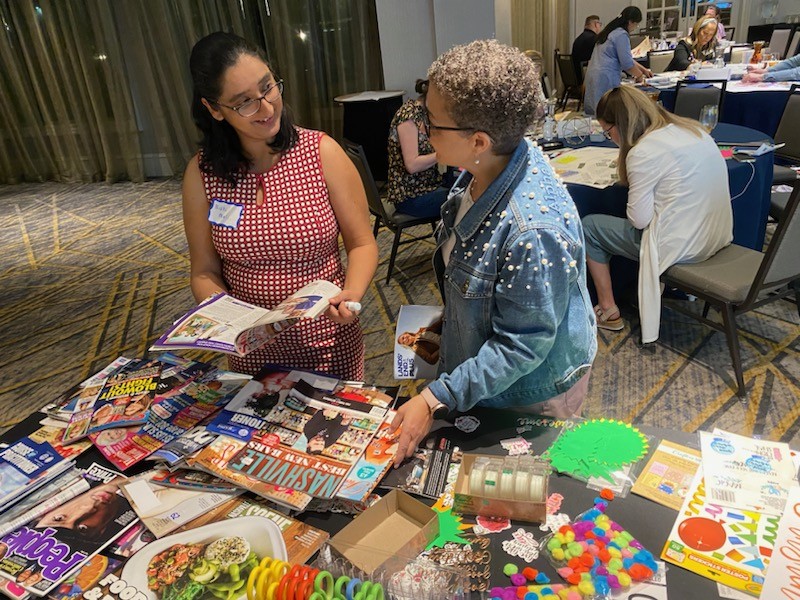Reflecting on 30 Years of Partners in Tennessee: Forward to 2053 and Beyond!
By Cathlyn Smith, Director of Leadership Development, 2020 to Present

I cannot begin to tell you how honored I am to help celebrate 30 years of Partners in Policymaking® in Tennessee. This historic feat took great leadership, focus, and support, along with the belief that Tennesseans with disabilities would benefit from this training.
The Partners story
Partners in Policymaking® was originally conceived in 1987 by the Minnesota Council. It has since been implemented nationally and internationally. The program overall has developed leaders that have affected local, state, federal, and international policies and communities.
No one had a crystal ball to see into the future. But our previous Executive Director, Wanda Willis, took a cue from the Minnesota Council on Developmental Disabilities and the Developmental Disabilities Act (the federal law that created councils like ours). Wanda felt that self-advocates deserved a space to learn about advocacy, how to impact policies, and, more importantly, use their voices and stories to make and create change in our state for individuals with disabilities and their family members.
Wanda shared with me that, “Partners in Policymaking is at the heart of all that the Council on Developmental Disabilities does. Partners graduates, Tennesseans with disabilities and their family members, drive Council priorities and are the most effective spokespersons on disability issues and needs. For these reasons, Partners will always be a priority for the Council.”
The past leaders of this program, Kevin Wright and Ned Andrew Solomon, laid a strong foundation which expanded and strengthened Partners over the years.
Partners graduates laid the groundwork for future progress and acceptance for individuals with disabilities and their family members. We were so very fortunate to have had their guidance and tenacity. Their footsteps and strides are everlasting!
A trajectory of change
The growth and expansion of Partners was linked to broader change in disability services. Many of us personally experienced the hardships, misunderstandings, and sacrifices of living with disability. For a new parent or someone with a new, life-changing disability diagnosis, there was no easily found roadmap to resources, medical understanding, attentive ears, and benefits. We have witnessed big changes over the past 30 years. But I would be remiss not to acknowledge that we are only 8 years out from the closure of Tennessee’s last large residential care facility, Clover Bottom.
Since then, more change has come. Many people who previously were served in institutional settings are now being served in their homes with family or are living independently with community supports. There is greater emphasis now on:
- sustainable employment and hiring,
- safer independent living environments,
- increased higher education learning opportunities,
- early intervention programs, and
- mainstream learning and behavioral supports.
We have Partners grads and leaders working in all these areas, continuing to make known the needs of people with disabilities. Their voices will ensure more people with disabilities can be challenged, inspired, and put on the path to success.
It was Partners’ voices who helped us see the need to create Tennessee Disability Pathfinder, together with the Vanderbilt Kennedy Center. Now, Pathfinder is funded by six different state agencies. It serves as a central portal to help the new parent or person with a new diagnosis find the information and services they need. We need YOU to help continue to share this great resource within your communities!
The continued power of Partners
I am constantly amazed at the confidence and enthusiasm Partners graduates still have from this program. That was true for the Partners grads I met before coming to work for the Council, and it’s true for the Partners classes I’ve had the honor to lead. I’ve had opportunity to witness a timeline of growth from individuals who were shy or felt they didn’t have anything to share. I’ve watched them blossom into non-stop advocates who tell their stores, tell businesses/agencies what they need, sit down and have engaged and informed conversation with legislators and local leaders – the list goes on. I share with Partners classes what I shared with my own daughter as she began to understand her own disabilities: When it comes to telling your story, no one can do that but YOU!
Toward the future
So, what will the next thirty years bring for Partners? My hope is that with continued input from our graduates, we will be able to keep enhancing TN Partners in Policymaking® to meet the diverse needs of Tennesseans. We plan to offer the most up-to-date information from agencies that serve people with disabilities. We plan to keep innovating in how we use technology to reach more participants across our state, including in rural and underserved communities.
We also plan to use the LifeCourse framework to focus our curriculum on the core areas that are necessary for a good life. We will keep central the values of the Developmental Disabilities Act and continue to emphasize advocacy skills that transfer to any situation our scholars may face. We’ll build an understanding of how all the parts of a person’s identity may affect their support needs and the barriers they face.
We’ve heard from many of our graduates with input on the path ahead. We will strive to build on the legacy of this program, investing in best practices that will propel our Partners graduates to be the best community leaders and advocates for our state. While our grads have a specific emphasis on the needs of the disability population, I am hopeful that their voices will be heard for all people.
Since I started with the Council, I’ve had the opportunity to speak with Colleen Wieck (one of the founders of Partners) on several occasions. She shared with me her thoughts about Partners moving forward:
“In 30 years, we will be celebrating the 100th anniversary of the Parent Movement, the 90th anniversary of the Independent Living Movement, and the 80th anniversary of the Self-Advocacy Movement. My hope is that in 2053, people will look back at our history and understand the immense struggles that we faced every day. In 2053, the vision and hope of every federal law will come true. Every person will be treated with dignity and respect. Every person will have the services and supports that match needs, requirements, and expectations. Every person will have the assistive technology to maintain independence, productivity, and self-determination. For babies born with disabilities in 2053, no family will ever feel alone. The path toward inclusion and belonging will be universally understood. Adults with disabilities will be treated as equal citizens. Ed Roberts, founder of the Independent Living Movement, believed that the impact of the Americans with Disabilities Act would not be felt for three generations, and he may be right in his prediction.”
While we’re still working toward the full fruition of the Americans with Disabilities Act and the Developmental Disabilities Act, we’ve made great strides toward that goal. However, there is still much to do. You are still needed every step of the way. As you’ve probably heard me say before…YOUR VOICE TRULY MATTERS!
Cathlyn Smith is Director of Leadership Development for the Council on Developmental Disabilities. In addition to Partners in Policymaking, she oversees the Council’s Leadership Academy for Excellence in Disability, a ground-breaking training for leaders of state disability services. She also manages the Council’s Scholarship Fund, which helps people with disabilities and their family members attend educational opportunities and take on leadership roles in their communities. She is a proud wife, mother/stepmother to four young adults, one with disabilities, and one fantastic grandson. She enjoys gardening, watching movies, and spending time with her family.
